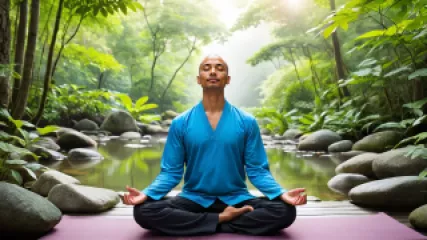Mindful Living: Understanding the Difference Between Mindfulness and Meditation
Mindful Living: Understanding the Difference Between Mindfulness and Meditation
Welcome to the world of mindful living! In today's fast-paced and chaotic world, many people are seeking ways to find peace, reduce stress, and cultivate a deeper sense of self-awareness. Two practices that have gained significant popularity in recent years are mindfulness and meditation. While these terms are often used interchangeably, they are not the same thing. In this guide, we will explore the difference between mindfulness and meditation, how they complement each other, and how you can incorporate them into your daily life.
What is Mindfulness?
Mindfulness is the practice of intentionally bringing your attention to the present moment without judgment. It involves being fully aware of your thoughts, feelings, bodily sensations, and the surrounding environment. Mindfulness allows you to observe your experiences as they arise, without getting caught up in them or reacting impulsively.
One of the key elements of mindfulness is cultivating a non-judgmental attitude. Instead of labeling thoughts and emotions as good or bad, right or wrong, mindfulness encourages acceptance and curiosity. By observing your experiences with an open mind, you can develop a greater understanding of yourself and the world around you.
There are various mindfulness exercises you can practice to enhance your awareness and presence. These exercises may include focused breathing, body scans, mindful eating, walking meditations, or guided visualizations. By incorporating these exercises into your daily routine, you can train your mind to be more attentive and responsive to the present moment.
What is Meditation?
Meditation is a broader term that encompasses various techniques and practices aimed at cultivating a calm and focused state of mind. While mindfulness is a form of meditation, not all meditation practices are focused on mindfulness. Meditation involves training the mind to achieve a state of deep relaxation and heightened awareness.
There are different types of meditation, including loving-kindness meditation, transcendental meditation, mantra meditation, and mindfulness meditation. Each type has its own unique approach and benefits. For the purpose of this guide, we will focus on mindfulness meditation.
Mindfulness meditation involves intentionally paying attention to the present moment, just like mindfulness. However, in meditation, the focus is often narrowed down to a specific object, such as the breath or a mantra. The goal is to cultivate a calm and concentrated mind by gently redirecting attention back to the chosen object whenever the mind wanders.
The Relationship Between Mindfulness and Meditation
While mindfulness and meditation are distinct practices, they are closely interconnected and mutually supportive. Mindfulness serves as the foundation for meditation, providing the necessary awareness and non-judgmental attitude. On the other hand, meditation deepens mindfulness by training the mind to sustain focus and develop greater clarity.
When practicing mindfulness meditation, you are not only cultivating mindfulness but also strengthening your ability to be mindful in everyday life. By regularly setting aside time for meditation, you create a space for self-reflection and introspection, allowing you to carry the benefits of mindfulness into your daily activities.
It is important to note that mindfulness and meditation are not quick fixes or instant solutions. They require commitment, patience, and consistent practice. With time and dedication, however, you can experience the transformative effects of these practices on your mental, emotional, and overall well-being.
Incorporating Mindfulness and Meditation into Your Daily Life
Now that you have a better understanding of mindfulness and meditation, you may be wondering how to incorporate them into your daily life. Here are some practical tips to help you get started:
- Set aside dedicated time: Find a quiet and comfortable space where you can practice mindfulness and meditation without distractions. Start with just a few minutes each day and gradually increase the duration as you become more comfortable.
- Establish a routine: Consistency is key when it comes to mindfulness and meditation. Set a regular time for your practice, whether it's in the morning, during lunch breaks, or before bedtime.
- Start with guided practices: If you are new to mindfulness and meditation, guided practices can be helpful. There are numerous online resources and mobile apps that offer guided meditations and mindfulness exercises.
- Be patient and compassionate: Mindfulness and meditation are not about achieving a specific outcome. Instead, focus on the process and be kind to yourself along the way. Accept that your mind will wander, and gently bring your attention back to the present moment without judgment.
- Integrate mindfulness into daily activities: Mindfulness is not limited to formal meditation sessions. You can bring mindfulness to everyday tasks such as eating, walking, or even washing dishes. Pay attention to the sensations, smells, and tastes, and fully engage your senses.
- Explore online mental health resources: In addition to practicing mindfulness and meditation on your own, consider exploring online mental health resources. There are many websites, apps, and virtual communities that offer guided practices, courses, and support for mindful living.
Conclusion
Mindfulness and meditation are powerful practices that can transform your life by fostering a deeper connection with the present moment and cultivating a greater sense of self-awareness. While mindfulness and meditation are distinct, they go hand in hand, complementing each other in the journey toward mindful living.
Remember, mindfulness is about being fully present and accepting of your experiences, while meditation is a specific technique to cultivate a calm and focused mind. By incorporating these practices into your daily life and exploring online mental health resources, you can embark on a transformative journey towards greater well-being and inner peace.






